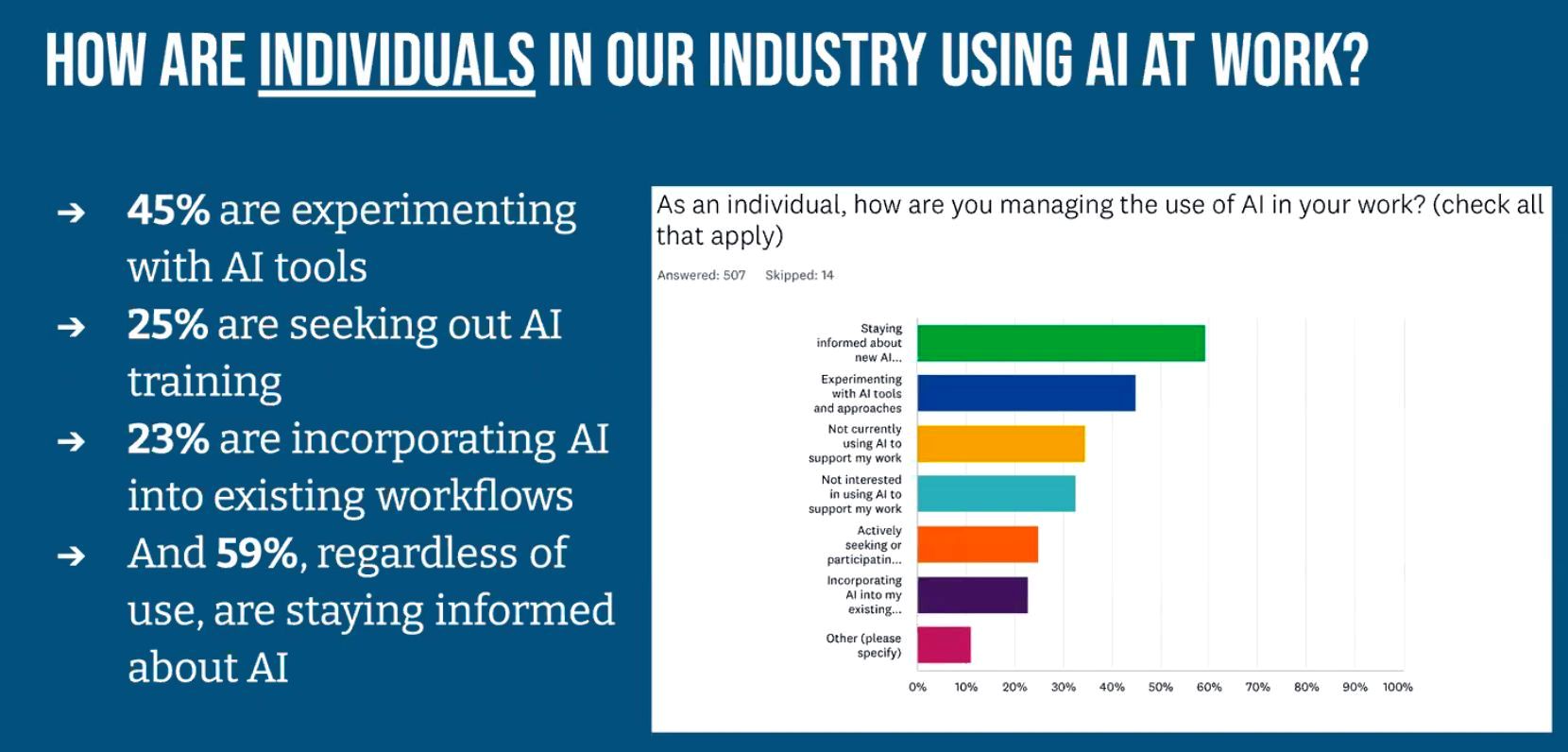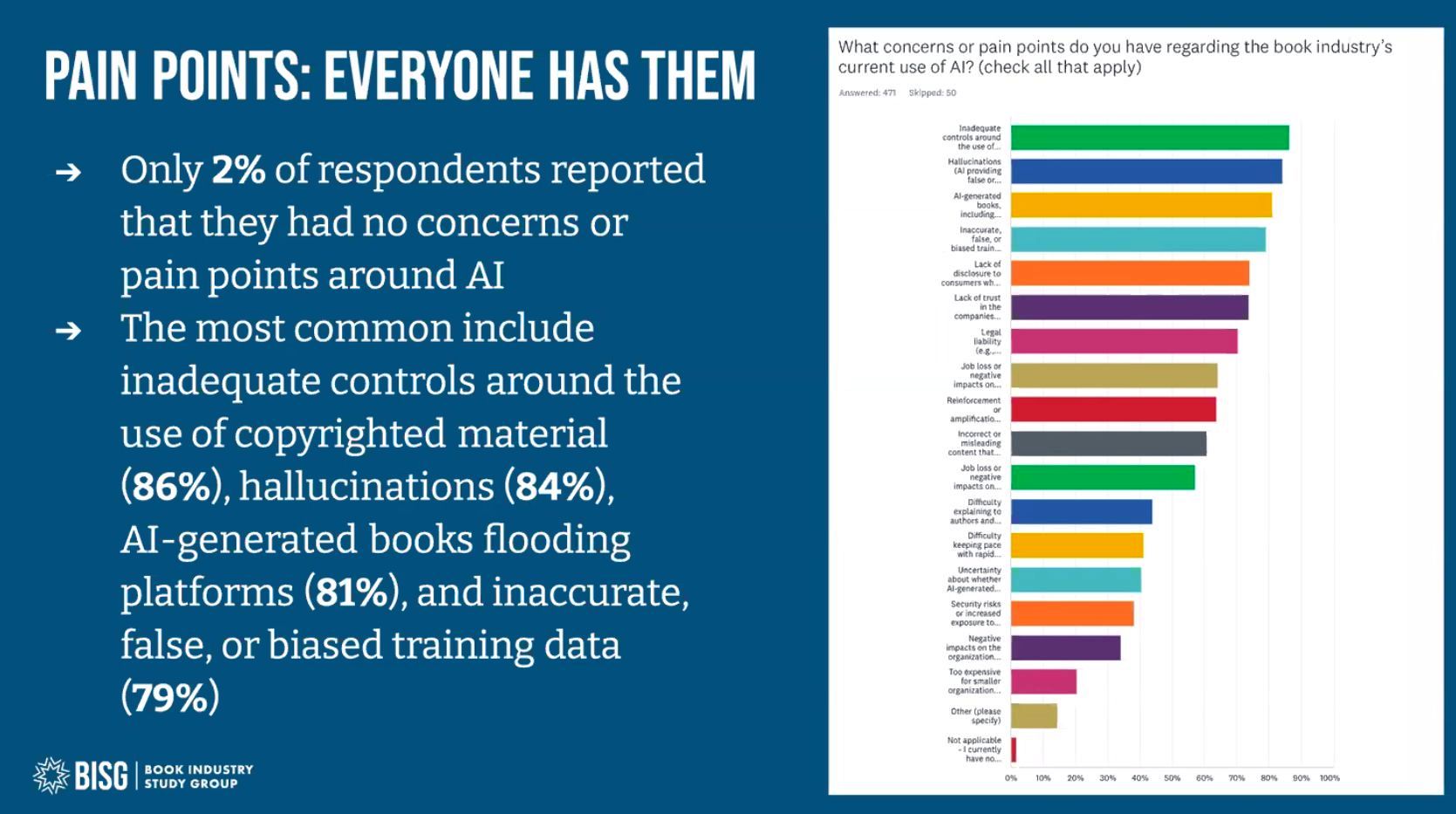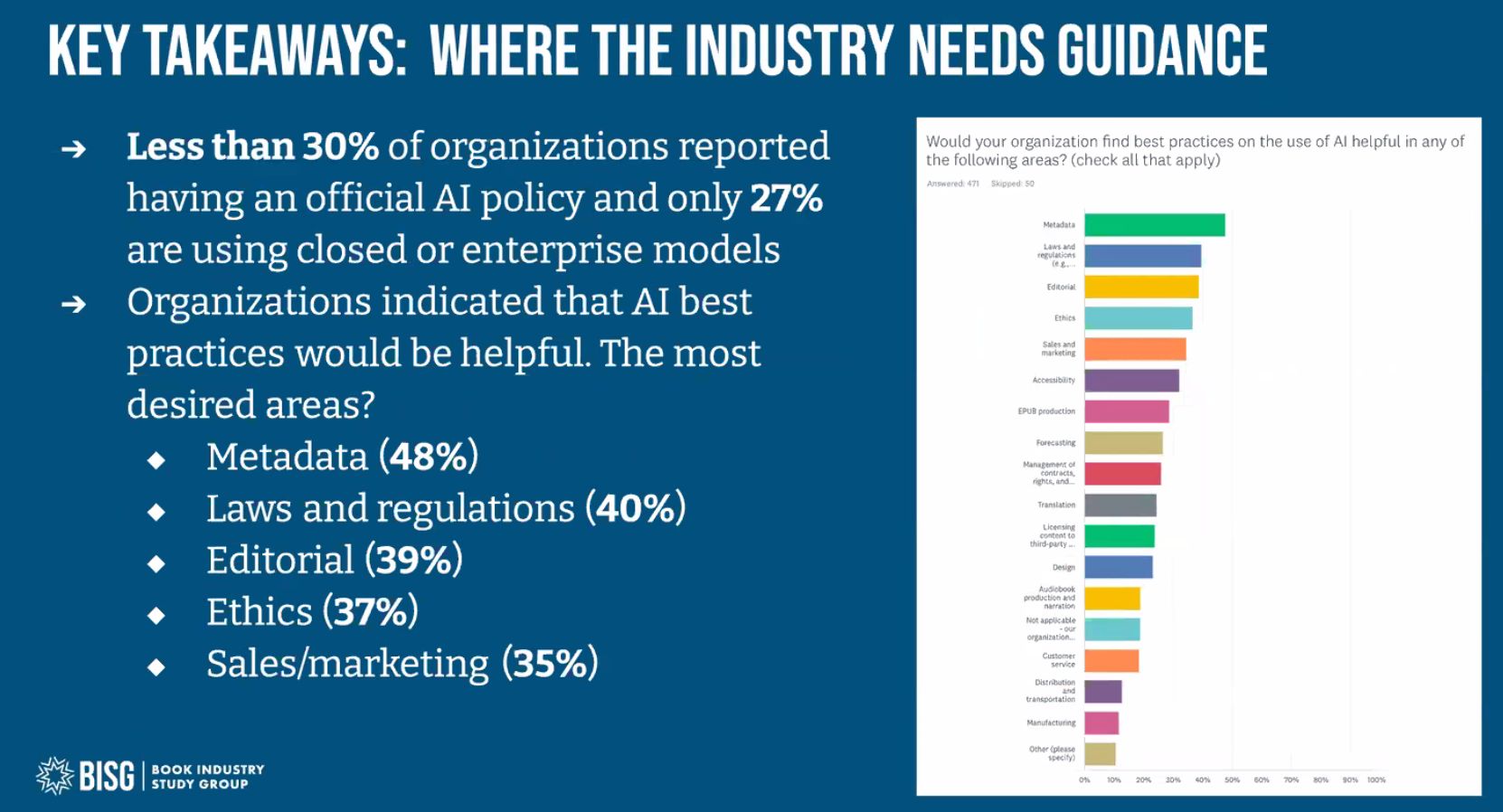September 18th, 2025
The Book Industry Study Group (BISG), in partnership with BookNet Canada, fielded a survey during June and July this year to better understand AI adoption in the book publishing industry. It’s the first comprehensive survey by a U.S. publishing association (see below for other studies). In a webinar, presented earlier today by BISG’s Brooke Horn and Brian O’Leary, we got a first look at the data.
 The findings show an industry struggling with a controversial and complex technology. Many are cautiously dabbling with AI, while uncomfortably grappling with myriad ethical, environmental, economic and operational concerns.
The findings show an industry struggling with a controversial and complex technology. Many are cautiously dabbling with AI, while uncomfortably grappling with myriad ethical, environmental, economic and operational concerns.
A total of 559 responses were collected. (6% were eliminated because they were from outside the North American market. 18% were Canadian respondents.)
The survey results paint an unsurprising picture: the book publishing industry is proceeding with caution. I sense that most are searching for a way to confront the conundrum: this technology has some evil roots and a potentially catastrophic impact on the world — but I think it could make my work easier, and perhaps better.
While half reveal that they are using AI, a third are not currently using it, and a similar percentage are not interested in using it at all. Nearly everyone expressed serious concerns about the technology. This does not auger well for increased AI adoption in publishing in the immediate future.
How Publishers Are Using AI
When publishing organizations do use AI, the primary focus is on efficiency. The most common applications are for administrative or operational tasks (29%), marketing (29%), and data analysis (21%). Editorial tasks also rank among the top uses (20%).
Conversely, the industry shows significant hesitation in other areas. The least common applications include creating AI-voiced audiobooks, QA testing, and rights and licensing management.
Widespread Concerns and an Urgent Need for Guidance
 While 45% are experimenting with AI tools (23% are incorporating AI into existing workflows), concern is nearly universal. A full 98% of respondents reported having at least one pain point with AI’s current deployment in the industry.
While 45% are experimenting with AI tools (23% are incorporating AI into existing workflows), concern is nearly universal. A full 98% of respondents reported having at least one pain point with AI’s current deployment in the industry.
The most pressing issues are:
- Inadequate controls around copyrighted material (86%)
- AI “hallucinations” or false information (84%)
- A flood of AI-generated books on retail platforms (81%)
- Inaccurate or biased training data (79%)
These concerns are compounded by a dearth of formal strategies. The majority of organizations using AI do not have official policies or guidelines in place to govern its use. Less than 30% have an official AI policy, and only 27% are using more secure closed or enterprise models to protect proprietary data.
 Is there a need for industry-wide standards, from organizations like BISG or NISO? When asked where they need guidance most, publishers pointed to metadata (48%), laws and regulations (40%), editorial (39%), and ethics (37%).
Is there a need for industry-wide standards, from organizations like BISG or NISO? When asked where they need guidance most, publishers pointed to metadata (48%), laws and regulations (40%), editorial (39%), and ethics (37%).
Issues, Concerns, and the Path Forward
One of the several concerns I have about the survey lies in the range of respondents. Brooke Horn indicated that most of the respondents work either for publishers, libraries, or service providers. And, she said, “there was a surprisingly strong participation rate from those that work independently, either as consultants, agents, indexers, or creators.”
While the overall response rate is very good, the diversity of the participants makes it difficult to paint an accurate picture by segment. Librarians use AI differently than agents. Scholarly publishers are, in many cases, further along with AI than trade publishers (educational publishers are in yet another category). We need more respondents from these sectors to draw better conclusions.
Another concern: One of the questions I posed to Brooke in the webinar was around the definition of “using AI.” It’s true that if you’re using Grammarly, or the built-in spelling and grammar tools in Microsoft Word, you are “using AI.” But I think that most people today understand that “using” means utilizing a tool that is explicitly labeled as AI, including ChatGPT, Microsoft Copilot, Perplexity.ai, and their ilk.
On the other hand, it’s quite possible to spend an hour playing with ChatGPT and Perplexity and then to self-define as an AI user. I hope that future surveys will separate casual users from committed users. I’d challenge respondents with this question: “Are the AI tools that you use enabling a fundamental shift in your daily publishing workflow?” The rest is just dabbling.
I imagine a future scenario of haves and have-nots. The haves will fully embrace AI tools and gain considerable workflow efficiencies and additional book sales. The have-nots will continue publishing the same way that they have for many years. It may not much matter to them that they’re taking a pass on a productivity tool, given their strong feelings about the technology.
The heart of trade publishing is low-tech, and proudly so.
BISG will release slides and the webinar video in the days ahead (the slides shown here are from screenshots).
NOTE: There have been several other surveys of AI use in publishing:
- A 2020 report, “People Plus Machines: The Role of Artificial Intelligence in Publishing” described a survey with 29 responses.
- In April 2024 PublishDrive offered “AI Adoption in Publishing: Findings from a PublishDrive Survey of Over 250 Professionals,” revealing “a complex yet optimistic view of AI’s role in publishing.”
- Proyecto451 in Argentina published a report in March 2025 “Uso y percepcion de las herramientas de lnteligencia Artificial en la industria del libro”, Available in English as” Use and Perception of Artificial Intelligence Tools in the Book Industry [in Ibero America]) available here (PDF).
- (November, 2025) Publishers Weekly has released its 2025 “Salary & Jobs Report.” They ask respondents about AI. “63% said their companies use AI. But the more familiar people become with the technology, the less they seem to like it. This year, 72% said they believe AI will be bad for publishing, up from 56% in 2024.”